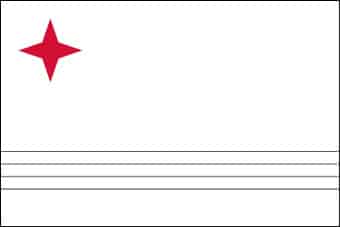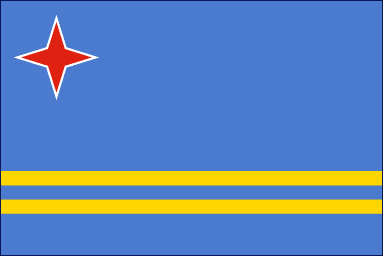
About Flag of Aruba
Since its formal adoption in 1976, the Aruba Flag’s design has not changed. At the bottom of the flag, two yellow stripes are placed on a blue background. On the upper left corner of the Aruba flag, close to the hoist side, there is a red star with a white border.
The figures and colours used in the Aruban flag have a deep meaning.
The four points of the compass, which are symbolic of the individuals of many nations who have immigrated to Aruba, are represented by the four red stars on the island nation’s flag.
The sand dunes that encircle Aruba on all sides are represented by the white border that surrounds the star.
The Aruba Flag’s blue backdrop is a representation of the ocean’s colour.
The island is moving towards becoming a distinct, self-governing part of the Kingdom of Netherlands, and the yellow stripes indicate that process. They also represent the mineral richness of the region, which helped the islanders flourish in the 19th century. The relationships, aspirations, and wishes of the Aruban people are symbolised by the flag of Aruba. The flag has a 2:3 ratio.
Historical Background
The current design of the Aruba flag was officially adopted on March 18, 1976, when Aruba gained autonomy within the Kingdom of the Netherlands. The flag’s design underwent some modifications before its final version, which is still in use today.
Facts about Aruba flag |
| Country | Aruba |
|---|---|
| Designed by | NA |
| Adopted | Mar 18, 1976 |
| Revision | NA |
| Design and Colors | A field of light blue (called “Larkspur”, two narrow parallel horizontal yellow (“Bunting Yellow”) stripes in the bottom half, and a four-pointed white-fimbriated red (“Union Flag red”) star in the canton |
| Size Ratio | 2:3 |
| Official Name: | Aruba |
| Capital: | 2:3 |
| Adopted on: | 1976 |
| Location: | Southern Caribbean Sea |
| Capital City: | Oranjestad |
| Major Cities: | San Nicolas, Santa Cruz, Noord |
| Area: | 69 square miles |
| Population: | 101,484 |
| Currency: | Aruban florin (AWG) |
| Language: | Dutch, Papiamento |
| National Anthem: | Aruba Dushi Tera |
| National symbol(s): | Hooiberg (Haystack) Hill |
| National colors: | blue, yellow, red, white |
| National anthem: | |
| Name: | “Aruba Deshi Tera” (Aruba Precious Country) |
| Lyrics/Music: | Juan Chabaya ‘Padu’ LAMPE/Rufo Inocencio WEVER |
Design and Colors
The Aruba flag features four equal horizontal stripes of vibrant colors. The top stripe is blue, followed by a red stripe, a white stripe, and a yellow stripe at the bottom. In the upper hoist corner, there are two white, five-pointed stars.
Symbolism of the Aruba Flag
Each color and symbol on the Aruba flag holds significant meaning. The blue stripe represents the clear skies and the surrounding Caribbean Sea. The red stripe symbolizes love, courage, and the Aruban people’s determination. The white stripe represents purity, tranquility, and the sandy beaches of Aruba. The yellow stripe signifies the island’s wealth, abundance, and the sun’s energy. The two white stars represent the island of Aruba and its cherished connections with the Kingdom of the Netherlands.
Usage and Protocol
The Aruba flag is proudly displayed throughout the island on government buildings, schools, and private residences. It is raised during national holidays, official ceremonies, and festive occasions. Proper protocol should be followed when handling and displaying the flag, ensuring it is treated with respect and dignity.
FAQs
Q1: When was the current design of the Aruba flag adopted?
The current design of the Aruba flag was officially adopted on March 18, 1976.
Q2: What do the colors on the Aruba flag represent?
The blue stripe represents the sky and sea, the red stripe symbolizes love and courage, the white stripe represents purity and tranquility, and the yellow stripe signifies wealth and abundance.
Q3: What do the two stars on the Aruba flag represent?
The two white stars represent the island of Aruba and its connection with the Kingdom of the Netherlands.
Q4: When is the Aruba flag raised?
The Aruba flag is raised during national holidays, official ceremonies, and festive occasions.
Q5: How should the Aruba flag be handled and displayed?
The Aruba flag should be treated with respect and dignity when handling it. Proper protocol should be followed when displaying the flag, ensuring it is raised on appropriate occasions.
Reference: Wiki

